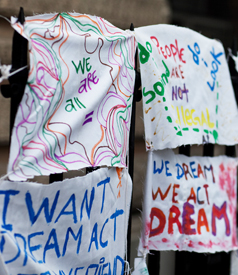Support justice-driven, accurate and transparent news — make a quick donation to Truthout today!
Thousands of left-wing activists just spent a week at the US Social Forum in Detroit, gathered again under the banner “Another World is Possible.” Among them hundreds added a new subtext: “Another Immigration Policy is Possible!”
This theme was especially popular among grassroots organizations in immigrant communities. Today, nontraditional worker centers are spreading across the US, including ones for day laborers, domestic workers, farm workers and other low-wage immigrants. Most are Spanish-speaking migrants from Mexico and Central America, but many also come from the Philippines, India, Pakistan, China and the Caribbean. If anyone should be in favor of immigration reform, these groups should be. Yet, instead of embracing the proposals made in Washington by Rep. Luis Gutierrez and Sen. Charles Schumer, they reject them.
The Social Forum was over by the time President Barack Obama made a speech about immigration policy a week later, but the forum’s message could as easily have been given to him as well. There are no significant differences between Obama’s ideas and those of Gutierrez and Schumer.
These grassroots groups don’t like the proposals for new guest worker programs. They have been fighting raids, firings and increased immigration enforcement for years, and are angry that the Washington proposals all make enforcement heavier. They want the border demilitarized. And they believe any rational immigration reform must change US trade policies that displace people in other countries.
Washington’s proposals for immigration reform all have a similar structure. They assure a managed flow of migrant labor to employers at low wages, through expanded recruitment by contractors in countries like Mexico. Immigrants must work to stay, and those who aren’t working must leave. To force the flow of undocumented workers into this program, the Washington bills all increase penalties for working or crossing the border without visas. And as the carrot, they propose limited legalization for undocumented people currently in the US.
These proposals originally came from large corporations in the Essential Worker Immigration Coalition, and were then supported by some unions and civil rights groups. These groups argued that corporations would never support legalization if they weren’t guaranteed a future flow of displaced people.
It’s not uncommon in Washington to hear arguments that “Mexicans would rather come to the US as braceros than die in the desert on the border,” or even “Mexicans are so desperate to migrate, they don’t care what kind of visa they have.”
In Detroit, it was obvious that immigrants do care. They don’t want to be used just as cheap labor, and want rights and equality with the people living around them. “We need a better alternative,” says Lillian Galedo, director of Filipino Advocates for Justice.
Renee Saucedo, who was born in Mexico and today directs the day labor program in San Francisco, says the biggest problem with the Washington consensus is that “it continues to mischaracterize migration as a ‘criminal,’ or ‘illegal,’ issue, rather than as a consequence of economic trade agreements and political repression that displace millions. Employers want to keep it this way to ensure their supply of cheap, vulnerable, exploitable labor.”
The Frente Indigena de Organizaciones Binacionales (FIOB), with an indigenous membership on both sides of the Mexico/US border, has historically opposed contract labor, or guest worker programs. “Migrants need the right to work, but these workers don’t have labor rights or benefits,” says FIOB’s binational coordinator, Gaspar Rivera Salgado. “It’s like slavery.” Many FIOB members are farm workers, and some remember the abuses of the old “bracero” program.
At the same time, Rivera Salgado cautions, “We need development in Mexico that makes migration a choice rather than a necessity – the right to not migrate. Both rights are part of the same solution. But the right to not migrate has to mean more than the right to be poor or the right to go hungry and homeless.” For that reason, after a long consultation process, FIOB announced it would “work to renegotiate NAFTA, because it creates migration by forcing poverty and inequality on the communities we come from in Mexico.”
Immigrant activists in Detroit called for broad legalization that would give papers to all undocumented people. They want the US to make more residence visas available, allowing migrants to choose where to live without making them vulnerable to employers. They opposed trade agreements like NAFTA. But most of all, they called for ending the criminalization of immigrants, whether by Arizona’s infamous SB 1070 law, or through the firings of thousands of people for lacking work papers. Over 350,000 undocumented migrants were incarcerated last year alone, in private detention centers.
“We should never fight for the rights of some at the expense of others.” Saucedo declares. “Legalization would be an empty victory if most immigrants still faced high exploitation, firings and raids.”
Holding Trump accountable for his illegal war on Iran
The devastating American and Israeli attacks have killed hundreds of Iranians, and the death toll continues to rise.
As independent media, what we do next matters a lot. It’s up to us to report the truth, demand accountability, and reckon with the consequences of U.S. militarism at this cataclysmic historical moment.
Trump may be an authoritarian, but he is not entirely invulnerable, nor are the elected officials who have given him pass after pass. We cannot let him believe for a second longer that he can get away with something this wildly illegal or recklessly dangerous without accountability.
We ask for your support as we carry out our media resistance to unchecked militarism. Please make a tax-deductible one-time or monthly donation to Truthout.
